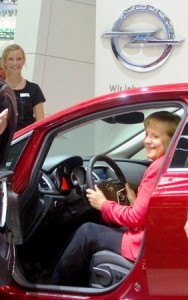German automakers have stepped their investment in new plants and equipment, according to a new report from the German Trade and Investment Agency – but much of the money is flowing overseas, particularly to China, as well as the United States.
The new Volkswagen plant in Chattanooga, Tennessee is only the latest example of how German makers are globalizing their investments, as is a new BMW plant in China. Many of the new projects are geared at sustainable mobility projects, according to the report.
“With several world-renowned automakers, Germany has long been a top location for automotive innovation. The paradigm shift to sustainable mobility again confirms Germany’s position as a launch pad for new technologies that can reach markets around the globe,” said Dr. Juergen Friedrich, Chief Executive of Germany Trade & Invest in Berlin.
BMW investments in China have recently doubled and construction of a new $600 million BMW plant in Leipzig is underway. The facility will soon see electric BMWs rolling off the assembly line, Friedrich said.
Volkswagen inaugurated its $1 billion plant in Tennessee less than two weeks ago and the maker appears to be giving serious consideration to adding a second U.S. plant for its Audi brand.
Porsche is investing $100 million in its new North American headquarters in Atlanta. Daimler is outfitting a new line of cars with Canadian-made fuel cells.
With a goal of six million electric vehicles on German roads by 2030, Germany’s automotive industry is thriving at home, added Friedrich, whose agency is holding an investor event on June 9 in Palo Alto to highlight the latest developments and business opportunities in Germany’s automotive industry, especially in eastern Germany.
Alongside intense private sector engagement, Germany has established an excellent political framework for investors with generous public subsidies, Friedrich said.
Last month, the Federal Ministry of Economics and Technology announced that it would double its research and grant budget under the National Development Plan for Electric Mobility, the German federal government effort to promote the use of EVs.
Friedrich also pointed to eastern Germany is an excellent production location for automakers seeking a secure business climate, highly trained workforce and access to the entire European market. The Trade and Investment Agency, a promotion arm of the Berlin government, advises foreign companies looking to expand their business activities in the German market. It also assists German companies looking to enter foreign markets.
With Chancellor Angela Merkel visiting Washington D.C. this week, the White House underscored Germany’s investment in the United States. Germany is among the five largest sources of foreign direct investment in the United States, with a total stock of $218 billion. Automakers like VW aren’t the only ones coming to the States. Major projects have included the recent ThyssenKrupp investment in Calvert, Alabama.
The United States is the largest source of foreign direct investment in the EU, meanwhile. The total stock of U.S. investments in Germany has topped $116 billion.
Some notable recent major investments include General Electric in Hamburg and First Solar in Brandenburg in Eastern Germany. Ford Motor Co. also is planning to construct a new design, development, and testing facility in Germany, according to the White House.

